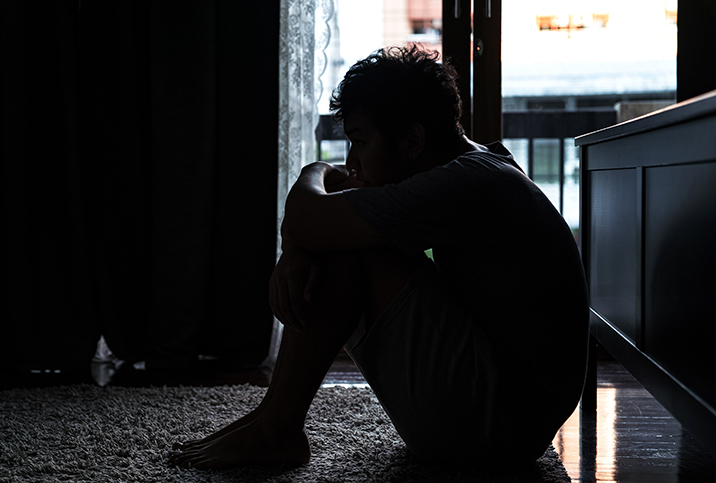Living With Someone Who Has Panic Disorder

Panic disorder is an anxiety disorder diagnosed in some individuals who experience panic attacks: sudden, overwhelming feelings of fear, doom or loss of control despite no apparent threat, accompanied by physical symptoms such as increased heart rate, shortness of breath and sweating.
Some estimates indicate about 1.7 percent of Americans ages 18 to 54, or 2.4 million people, suffer from panic disorder each year. One 2016 analysis concluded that about 13 percent of the global population experiences a panic attack during their lifetime. Panic disorder typically develops in young adulthood, and the condition appears to have a genetic component. Women are twice as likely as men to develop panic disorder.
If you have a loved one who suffers from panic disorder, it's important to understand the condition and how to help them live with it—and help yourself at the same time.
Overview of panic disorder
Panic disorder is characterized by extreme, constant fear of subsequent experiences. Causes for panic disorder are unknown, and not everyone who experiences panic attacks gets panic disorder, but it's thought that similar factors play a role in each condition: extreme stress, being prone to negative emotions, genetics and family history. Major life changes, childhood abuse, experiencing trauma, smoking and excessive caffeine intake all increase the risk of developing panic disorder.
Panic disorder can make life incredibly challenging, even debilitating. Living in constant fear of an attack often results in avoidance of triggering situations. In some instances, individuals miss out on basic aspects of life, such as going out in public, driving a car, using public transportation or traveling. Others are terrified to even leave their home. Panic disorder increases the risk of self-harm, suicidal tendencies and alcohol and substance use.
Impact on relationships
The struggles of people living with panic disorder can place significant stress on relationships. Friendships may suffer if one person is distant and reluctant to get together or even communicate. Love relationships can become strained, especially if work and financial problems arise.
Tips for living with someone who has panic disorder
If you're living with an individual who isn't in treatment for their disorder, encourage them to get professional help. (A behavioral health evaluation can confirm their diagnosis.) Panic disorder is treatable, and sticking to a treatment plan can reduce attacks and symptoms. Psychotherapies and medications (SSRIs, SNRIs, benzodiazepines) are common treatments, which may be supplemented by meditation, writing, aromatherapy and herbal teas.
Since exercise can be beneficial, be active together by taking walks, going cycling or doing whatever brings joy and relieves stress. When you're out, remember your loved one's triggers and help them avoid those that are avoidable and be supportive in ones that aren't. If they experience a panic attack while they're with you, talk them through it. Practicing yoga can be particularly therapeutic for anxiety and panic due to the focus on deep breathing. It is something couples and friends can learn and practice together.
Always be as calm and patient as possible. It may be frustrating to watch someone panic over something you believe isn't the least bit threatening, but they can't control what's happening. Try to understand what the situation looks like to them. Asking them (in a calm, safe space) to describe their feelings and the sensation of an attack can help you put yourself in their shoes. Engage with them frequently in calming methods such as meditation and yoga, and during triggering moments, try deep breathing alongside them. Remind them of coping skills such as using relaxing essential oils and repeating an empowering mantra.
What to avoid
Never laugh at an individual who has panic disorder or ridicule their disorder. Never question their discomfort or accuse them of exaggerating their fear. Never say: "It's not a big deal" or "You'll be fine" or make similar comments. This is not helpful and may cause them to lose trust in you as a support system. Understand and avoid potential triggers, including stressful or contentious topics.
Taking care of yourself
Do set boundaries with your loved one. You can't be their only support pillar, nor can they use you as a crutch to deal with their condition. You need to maintain your own life, and they should remain independent. Enlist help from friends or family members when you need it. Make sure you're still enjoying hobbies and seeing your friends. The National Alliance on Mental Illness (NAMI) offers support groups for family members.
Discovering how to support your loved one without coddling is essential. You're there as a loved one, not a therapist or personal coach. You should feel able to be open and honest about how you're doing, including discussing issues within the living situation or relationship that aren't working.
There's no quick fix for panic disorder, but patience, understanding and a calming presence can go a long way in supporting a loved one who is coping with it.

















